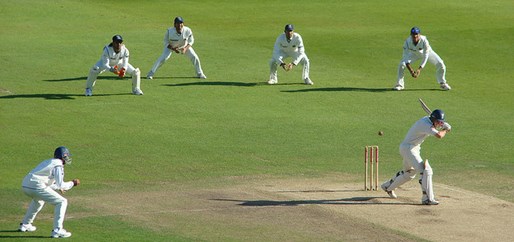New report calls for governance reforms in cricket

An independent review of the governance practices of the ICC calls for reforms in cricket. Photo: gin soak/Flickr
As an English invented sport, cricket has developed from being played mainly in a few countries once belonging to the former British Empire to a sport practised worldwide and with rising commercial value and income.
But neither the sport’s international governance principles nor its democratic structure matches the development, concludes a new independent review of the International Cricket Council, ICC.
“Cricket is a great game. It deserves to have governance, including management and ethics, worthy of the sport. This is not the position at the present time,” as Lord Woolf of Barnes and PricewaterhouseCoopers sharply writes in their report named ‘An independent governance review of the International Cricket Council’.
After consultations among the sport’s many stakeholders, the report calls for fundamental reforms in the ICC which has a peculiar political structure where only 10 countries – England plus nine former colonies, now independent nations – are granted full membership rights as ‘test match-playing’ cricket nations.
The remaining 95 countries are placed in two secondary categories with limited or very few rights. This has to be changed, the report concludes.
“Currently the ICC reacts as though it is primarily a Members club; its interest in enhancing the global development of the game is secondary. In today’s environment this is not an acceptable situation. Cricket is a global game and there is a need for global governance.”
65 recommendations
The final report from Lord Woolf of Barnes and PricewaterhouseCoopers goes on to present 65 recommendations, including a wide range of changes to the structure of the board, the administration and structure of cricket, the ethical issues of governing and the funding schemes.
Without giving up the category of full membership, the full membership status should be available for more countries than today on transparent and objective criteria, and the remaining countries should be secured more influence at the very top of the ICC. Today the 10 full members all have a permanent seat on the ICC board leaving only three seats for the second highest member class, the associate member nations. The so-called affiliated nations are not represented at all.
The report also suggests changes in the funding of ICC and a more equal distribution of the increasing revenues from TV rights and sponsorships with focus on the global development of the sport. Today 75 percent of the ICC’s income is earmarked to the 10 full member nations.
Also, the report calls for more transparency and clearer governance principles when it comes to the decision making processes, the daily administration of cricket and the financial matters in the ICC as well as its national member federations.
As the report warns:
“The ICC needs to ensure that an effective ethical code, covering both on and off-field activities is developed, embedded, policed and consistently enforced; with all Members being expected and required to adopt similar standards within their own Member bodies.”
The risk of corruption
Transparency International welcomed the launch of ICC’s Governance Review before Christmas, and stated that it was a “timely opportunity to review the corruption risks facing the game of cricket, and strengthen the game’s institutional response”.
Transparency International submitted 20 recommendations to Lord Woolf, one of the key points being that while the players are the ones who face greatest public scrutiny, it is the administrators, both at the international and national level, who set the infrastructure and environment in which players and match officials operate. And this must be transparent and accountable.
The final report acknowledges the risk of corruption and misbehaviour ‘off-the-field’ and points out political ‘side deals’, unclear voting patterns and different forms of ‘institutional conflict of interest’ as challenges to be addressed. The report suggests a number of initiatives from strengthening the good governance policies and rules to the introduction of a new ‘speak-up hotline’ for whistle-blowers and others with ethical concerns.
On top of the 65 formal recommendations, the report also mentions a number of suggestions from the external submissions received during the review like a more substantive dialogue with the fans, for example though the establishment of a new Supporters Committee.
A sign that the weather is changing?
The ICC Board, Members and other stakeholders are expected to study the report in detail until the next ICC Board meeting in April 2012, where the report and its recommendations will be addressed.
Sceptics warn that the report will meet strong resistance among the privileged ‘full member’ cricket nations who are likely to be reluctant giving up their political and economical privileges.
Nevertheless, the ICC independent governance review, which lately has been complimented by an independent review on the ICC arrangements against on-field corruption like match-fixing, is one in a line of recent initiatives undertaken by big international sports organisations to weed out corruption and introduce better governing routines – or attempt to do so.
As Professor Roger Pielke Jr. argues on his blog on sports politics: The pressures on the ICC, FIFA and others suggest that while we may not yet be experiencing a ‘Sporting Spring', there are sure signs that the weather is changing.
See the ICC's statement regarding the report on the ICC website
Read the full report
http://leastthing.blogspot.com/2012/01/lord-woolfs-review-of-international.html
http://static.icc-cricket.yahoo.net/ugc/documents/DOC_6E43A6280C922ABC51A9C6AB55AA58E1_1328155148580_481.pdf
http://icc-cricket.yahoo.net/newsdetails.php?newsId=18894_1328146020





